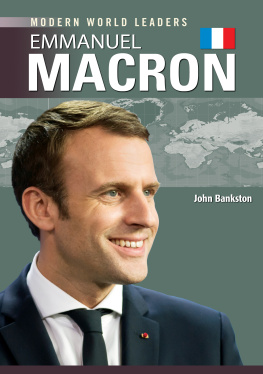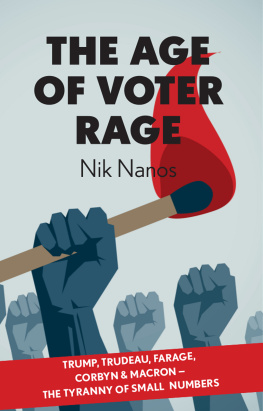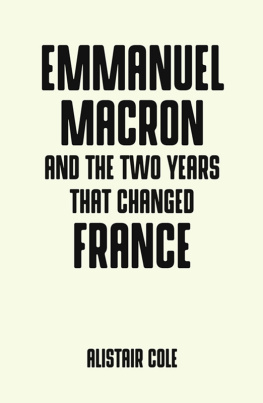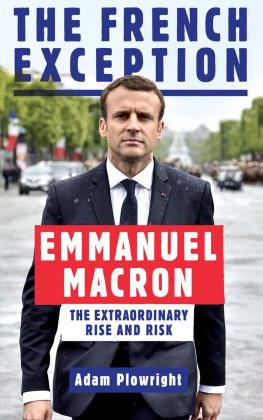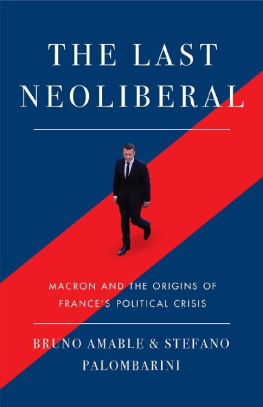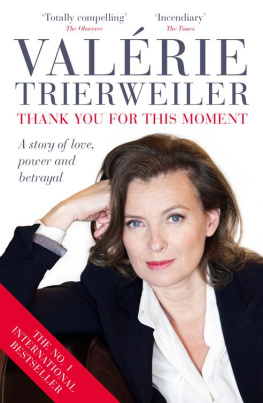John Bankston - Emmanuel Macron
Here you can read online John Bankston - Emmanuel Macron full text of the book (entire story) in english for free. Download pdf and epub, get meaning, cover and reviews about this ebook. year: 2018, publisher: Infobase Publishing, genre: Detective and thriller. Description of the work, (preface) as well as reviews are available. Best literature library LitArk.com created for fans of good reading and offers a wide selection of genres:
Romance novel
Science fiction
Adventure
Detective
Science
History
Home and family
Prose
Art
Politics
Computer
Non-fiction
Religion
Business
Children
Humor
Choose a favorite category and find really read worthwhile books. Enjoy immersion in the world of imagination, feel the emotions of the characters or learn something new for yourself, make an fascinating discovery.
- Book:Emmanuel Macron
- Author:
- Publisher:Infobase Publishing
- Genre:
- Year:2018
- Rating:3 / 5
- Favourites:Add to favourites
- Your mark:
- 60
- 1
- 2
- 3
- 4
- 5
Emmanuel Macron: summary, description and annotation
We offer to read an annotation, description, summary or preface (depends on what the author of the book "Emmanuel Macron" wrote himself). If you haven't found the necessary information about the book — write in the comments, we will try to find it.
The youngest president in Frances history, Emmanuel Macron began his political career on the staff of former French president Franois Hollande. However, his relationship with Hollande and his administration soured, so Macron founded his own poli
Emmanuel Macron — read online for free the complete book (whole text) full work
Below is the text of the book, divided by pages. System saving the place of the last page read, allows you to conveniently read the book "Emmanuel Macron" online for free, without having to search again every time where you left off. Put a bookmark, and you can go to the page where you finished reading at any time.
Font size:
Interval:
Bookmark:
Copyright 2018 by Infobase
All rights reserved. No part of this publication may be reproduced or utilized in any form or by any means, electronic or mechanical, including photocopying, recording, or by any information storage or retrieval systems, without permission in writing from the publisher. For more information, contact:
Chelsea House
An imprint of Infobase
132 West 31st Street
New York NY 10001
ISBN 978-1-4381-8577-4
You can find Chelsea House on the World Wide Web
at http://www.infobase.com
France was in trouble. Young people couldn't get jobs. Many of them left the country. Laws made it hard to fire anyone. Unfortunately, that also meant companies didn't want to risk hiring new employees. If the new hire didn't work out, the company still had to keep paying their wages.
Small businesses like shops and restaurants had to close on Sundays. They also closed in the afternoon. If the owners wanted different hours, it didn't matter. Changing the rules was difficult. Anytime a president tried, streets filled with protesters. Sometimes there was violence.
"Our country is ill," former French Prime Minister Alain Juppe said in a speech reported by the New Statesman in April of 2017. Juppe believed his country was "resistant to reforms that it knows are necessary, angry with its political elites but susceptible to demagogic promises, it is experiencing today a terrible crisis of confidence."
In 2014, Emmanuel Macron thought he could succeed where others had failed. He wasn't a prime minister. He wasn't a president. He was the country's Minister of Economy and Finance. He'd only had the job for a few months. When he was appointed, he was 36 years oldone of the youngest cabinet ministers in French history.
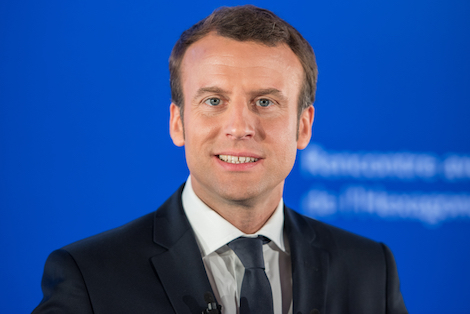
Emmanuel Macron
Source: Shutterstock.
In college, he was more interested in philosophy than politics. After graduating, his first job was in government, but he later paid 50,000 to get out of his contract. Much of his career was spent in banking. Macron was a millionaire in a political party that championed the poor. Many of his fellow socialists didn't trust him.
Macron's fame arrived with a law bearing his name: "Loi Macron" would allow small businesses to stay open one Sunday a month. Besides changing rules governing store hours, Loi Macron would do other things, like make it easier for young legal professionals to open offices.
"It scarcely seems revolutionary, for instance, to allow shops in certain tourist areas to open on Sunday once a month, up from five times a year under current rules," The Economist magazine wrote in December of 2014. "And the bill is expected to say nothing at all about the 35-hour working week, despite Mr Macron's regular criticisms of its constraint on French business."
Conservative politicians had long tried to change the law, which forced companies to pay overtime after 35 hours (in the U.S., overtime is usually paid after 40 hours). Critics believed it unnecessarily added to the expense of running a business. Supporters thought it would force companies to hire more workers.
His own party railed against Loi Macron, despite a poll showing 75 percent of Parisians wanted stores open on Sundays. Socialists argued that requiring businesses to give their employees the day off was good for workers. In The Economist article, Socialist legislator Pascal Cherki complained, "My objective is not to vote for all the measures that [former Conservative President Nicolas] Sarkozy did not manage to pass and which we fought against in opposition."
Fellow socialists weren't the only ones who disliked the bill. Some more conservative legislators had their own issues. In 2017, Francis Vercamer, a member of the centre-right Union of Democrats and Independents, told reporter Alissa J Rubin that he had proposed several amendments privately to Macron. Although Rubin said the Minister was supportive when they were brought before the legislature, he opposed them all. "I don't want to say it was dishonest because that's not the right term," Vercamer explained. "But for someone who comes to a private meeting and says, 'This is good,' and then comes to a public meeting and doesn't support you and doesn't give a reason, that's not worthy of a representative of the Republic."
Vercamer's amendments were a tiny fraction of the ones legislators tried to add to the bill after French Prime Minister Manuel Valls took it to the National Assembly, a legislative body similar to the U.S. House of Representatives. There, Macron endured 82 hours of parliamentary commission debate over 1,967 amendments. Four-hundred-ninety-five were adopted. When the amended bill was presented to the Assembly, Macron sat through another 111 hours of debate while nearly three thousand additional amendments were proposed, with 559 adopted.
Macron admitted he considered resigning if the bill wasn't passed. "But I think it was not an option, because we have to progress," he told The Wall Street Journal in 2015. "We have to go further, and we want to deliver."
Yet after all of that time and all of that work, Macron and Valls realized that Loi Macron didn't have the votes to pass. The bill was pulled. In many countries that would mean the end of it. France is different.
In the U.S., a bill has to be supported by the majority of both Senators and Representatives in order to reach the President. The President then must sign the bill for it to become a law. The French Constitution allowed the President to turn a bill into a law without legislative support. Legislators can only stop the President if a majority of them vote "no confidence." This means they dissolve the government, triggering a presidential election. It's a drastic and very rare step. After Socialist President Francois Hollande used the Constitutional maneuver to make Loi Macron a law without a vote in the Assembly, members of his party were upset. Macron was more interested in France's problems than other politicians' concerns.
"France is sick and we are facing difficult times," Macron told The New York Times in 2014, echoing Juppe. The former prime minister was a Conservativea party that many believed focused on the needs of businesspeople. Conservatives had long tried to change France's 35-hour work week. Macron was a member of the same party that led protests against changes in work rules. He explained in the interview, "For me being a Socialist today is about defending the unemployed, but also defending businessmen who want to create a company, and those who need jobs. We have to shift the social model from a lot of formal protections toward loosening bottlenecks in the economy."
It was an opinion many in his country shared. France usually has a much higher unemployment rate than places like Germany, England or Norway. For over three decades, it rarely dropped below eight percent. By 2014, it was hovering around ten percent. Even worse, one out of four people under age 30 who wanted a job couldn't find one.
Just a few months after championing Loi Macron, the Economics Minister championed a movement. It would borrow ideas from Conservatives and from Socialists, while remaining independent of them both.
The group met on the second floor of an unremarkable building in Paris. Most of them were in their 20s or 30s. Few had ever worked on a political campaign before. Even fewer had held a political office. They weren't lawyers and legislators. They were bakers and bloggers. They were ready for a change.
Font size:
Interval:
Bookmark:
Similar books «Emmanuel Macron»
Look at similar books to Emmanuel Macron. We have selected literature similar in name and meaning in the hope of providing readers with more options to find new, interesting, not yet read works.
Discussion, reviews of the book Emmanuel Macron and just readers' own opinions. Leave your comments, write what you think about the work, its meaning or the main characters. Specify what exactly you liked and what you didn't like, and why you think so.

